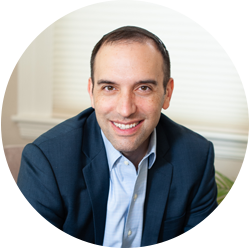Shalom Chaverim,
Over the past few months, and specifically these past few weeks, I’ve been thinking a lot about the brokenness of our world, and about what it means for leadership and the character of our community.
When times are good it can be easy to coast along, to succumb to the illusion that things are as they should be, and to focus more on maintaining status quo than on doing the hard work of changing and growing. Times of crisis, however, force a reckoning with our current reality and a reimagining of the future we aspire to create.
In this week’s Torah portion, we read the tragic account of “the spies,” whose failure of character and leadership condemns the Israelites to 40 years of wandering in the desert in lieu of a shorter, straighter path to the Promised Land. It is a story about the past and the future, fear and hope, leadership and followership. It is about perspective: To quote Steven Covey, "the way we see the problem is the problem."
Several months ago, I was reminded by a CJP Board member of the "the Stockdale Paradox,” a concept developed by Jim Collins in his book Good to Great. After meeting Admiral James Stockdale, who survived as a prisoner of war in Vietnam for more than seven years, Collins described this paradox to explain Stockdale’s extraordinary resiliency: the willingness to confront the brutal facts of the reality you are in, while at the same time not losing faith that you will prevail in the end.
This might also explain the difference between optimism and hope as Rabbi Jonathan Sacks sees them. Optimism, Sacks writes, is choosing to see your current reality through rose-colored glasses; hope is the believing that, given the reality of the way the world is right now, the future can be different, and the world can get better. Hope links directly to human agency and responsibility, for we have critical roles to play in shaping the future.
This is the message of the story of the spies. When 12 of them go to “scout out” the land, they find that it is flowing with milk and honey, but also filled with “giants” — enemies, challenges, risks, and reasons to believe that this endeavor might not be successful. The reality is that fulfilling their destiny, completing their mission, and entering the Promised Land, will not be easy.
Ten return with a message of despair. They respond to their reality with fear and loss faith in God, in Moses, in their mission, and in the people themselves. Two of them, Joshua and Caleb, exemplify the Stockdale Paradox in just two words: "aloh naaleh" — “Surely we can go up (into the land, and be successful).” They don't refute the hard facts. They don’t say, “It's not true, everything is fine, this will be easy.” They do, however, refute fear and resignation with a message of confidence and hope: aloh naaleh — we can do this.
Today is Juneteenth, a holiday celebrating the end of slavery, of which I confess that I, like many white people, was just vaguely aware until a few weeks ago. At CJP, staff are marking the day by coming together to learn, reflect, and hear colleagues’ personal experiences. It is one early step in our process of education and introspection. We will not turn away from the brutal facts of the reality we are in. And we will also not abdicate our responsibility for making ourselves, our society, and our world better.
This month is also Pride Month, celebrated each June to honor the Stonewall uprising, a tipping point in this country for LGBTQ+ rights. This week’s Supreme Court decision marked another historic moment in the advancement of LGBTQ+ dignity and equality under American law. We should be proud that organizations like Keshet here in Boston, and Eshel Online are leading the way for Jewish communities everywhere.
Both Juneteenth and Pride Month remind us that we can, and we have made progress. They also force us to confront the reality that we have a long, long way to go. It feels to me like we are living through a watershed moment in this country and in the Jewish community. How will we respond?
In The Soul of America, Jon Meacham writes, “Progress in America does not usually begin at the top and among the few, but from the bottom and among the many. It comes when the whispered hopes of those outside the mainstream rise in volume to reach the ears and hearts and minds of the powerful.” As a Jewish community, we need to recognize that we are both the mainstream and the powerful. We need to raise our voices and to listen, deeply, to the whispered hopes of others.
When confronted with the spies’ reports, Israelites had a choice of how to respond to the competing messages of fear and hope. Their whispered hopes were crushed, and they could not bring themselves to say “aloh naaleh.” Can we?
Shabbat Shalom,
Rabbi Marc Baker

About the Author
CJP President and CEO Rabbi Marc Baker is an educator, writer, and leadership mentor who is devoting his life to Jewish learning and building Jewish communities.
